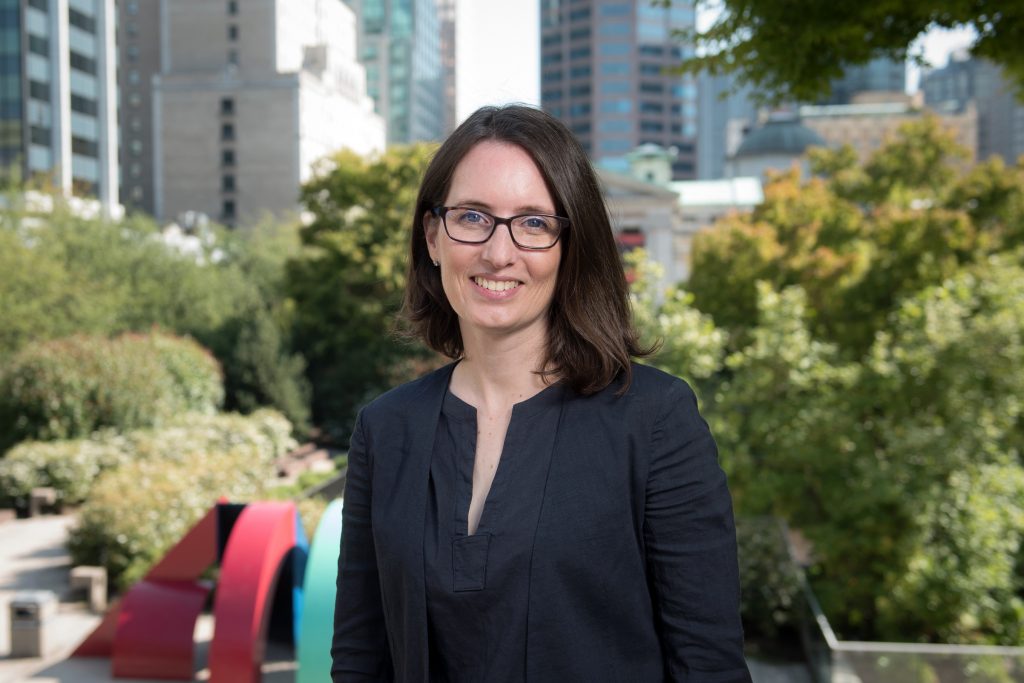Navigating sustainability: SFU Beedie professor steers organizations to success in corporate governance
May 03, 2022

SFU Beedie professor Stephanie Bertels helps organizations embed sustainability into their decision-making through her research and work.
Stephanie Bertels, W. J. VanDusen Professor of Sustainability at SFU’s Beedie School of Business, is a regular thought partner for the executive teams and boards of global companies interested in improving their sustainability performance.
Through her work with SFU’s Centre for Corporate Governance and Sustainability and the Embedding Project, Bertels’ research examines how companies embed sustainability across their operations and do their part to support communities and the planet.
As the director for SFU’s Centre for Corporate Governance and Sustainability, Bertels supports the Centre’s goal to provide innovative and relevant research on corporate governance and sustainability with a focus on how global companies navigate changing governance obligations, including changing needs around environmental and social responsibility.
“It’s really about spurring conversations with companies around integrating sustainability into their decision-making,” says Bertels. “It’s an opportunity for executives and directors to understand the changing landscape and recognize the practical implications of considering environmental and social issues as part of your core governance processes.”
With increasing pressure around the world for senior executives and board directors to articulate public positions on key issues, executives have an opportunity to better understand these issues and understand what it would mean for their companies to take credible action. Bertels has conducted research over the past few years to help companies understand how to articulate a credible public position on key environmental and social issues, including climate change, equity, diversity and inclusion, and Indigenous rights.
One of her research projects examines what the characteristics of a credible public statement are, with the results compiled into a free database of corporate position statements that includes assessments of the quality of the statements according to transparent criteria.
“We found that it’s important for companies articulating a public statement to do three things,” says Bertels. “The first is to explain their understanding of the issue and really clarify what information they’re using to shape their understanding of it. The second is to tie that understanding back to their own business—how do their operations create direct impacts on this issue? And the third piece is to articulate a credible commitment to do their part, including how these commitments will be resourced.”
The Centre has also partnered with organizations such as CPA Canada and the Salzburg Global forum to promote global conversations with governance professionals around the world on emerging topics in the sustainability and social responsibility sphere. For instance, last year Bertels moderated a global conversation with directors on tying environmental, employee, social and governance (EESG) performance into executive compensation.
Bertels also founded the Embedding Project, a global public-benefit research project that connects with business sustainability researchers and companies around the world in a broad range of industries to embed sustainability into their governance, operations and culture.
The Embedding Project boasts numerous success stories. Locally, the project has worked with Vancity to support the credit union in its approach to climate justice and how it can create positive influence more broadly within the financial sector. They have worked closely with the Port of Vancouver for several years in supporting its vision to be the most sustainable port in the world. They also continue to collaborate with Teck Resources, helping the organization to track leading sustainability practice.
“We want companies to embed sustainability into their core strategies rather than having a separate strategy for sustainability,” says Bertels. “We help them to identify and prioritize where they should be directing their efforts to ensure that they are contributing to positive change in their own operations and in their value chain.”
